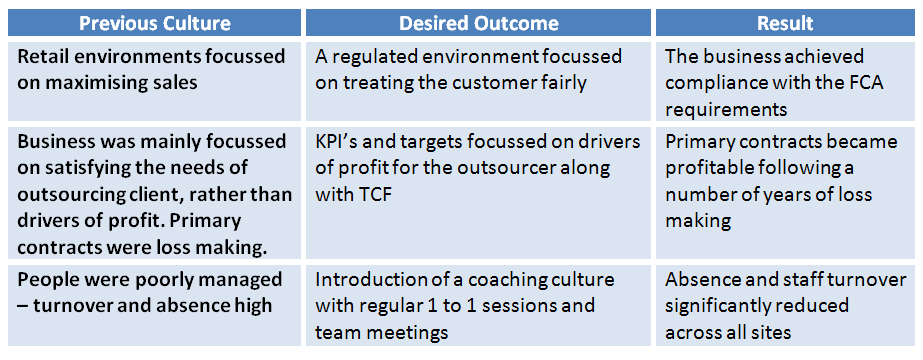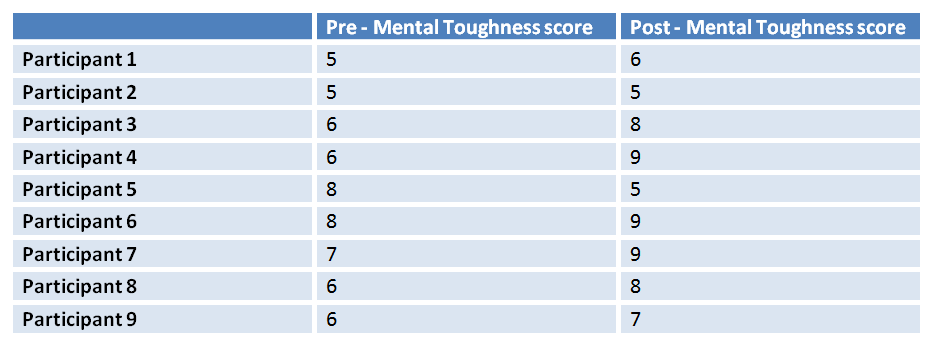Case Studies in Organisations
A culture change programme
In 2014, UK retail credit became regulated by the FCA as part of a restructure of the OFT. In order to meet the regulatory requirements and drive forward the performance of the business, a major UK outsourcing organisation, operation in the private sector, engaged AQR Coaching and Mentoring to deliver and integrate a coaching based Management Development Programme across its 5 sites (4 in the UK and 1 in South Africa). The programme was delivered to over 200 Senior and middle managers across the business, who were all assessed in each program element to become certified as competent.
The programme was designed to deliver changes in culture in order to ensure that the business complied with the requirements of a regulated entity and to drive improvements in efficiency and profitability. Key elements of previous culture within the business and desired outcomes are shown in the table below along with the business results in the months following completion of the programme:

The programme was designed around 3 themes:
Transition to a regulated environment
This element was to educate participants about regulation and the key concepts of ‘Treating the Customer Fairly’ (TCF) as well as introducing the Training and Competence scheme for the business and the systems and processes which support a regulated environment.
Mental toughness development
This element was seen as critical to deliver the change in culture required across the business. All managers were assessed and coached in developing their own Mental Toughness and were developed to support their teams to develop Mental Toughness. The table below summarises the mental toughness scales and how they aligned to desired elements of changes in behaviour and culture.
Coaching skills
This element was to help managers across the business coach and develop team members in both business skills and mental toughness. Coaching skills were interwoven into all aspects of the role and managers were encouraged to coach their peers and customers as well as their teams. Processes to continually develop and support the managers as coaches were introduced within the business as part of the programme.
Outcomes
The programme delivered a number of tangible changes across the business, which led to a number of positive outcomes, including:
- Full Compliance with the FCA regulations
- Reduction in total staff costs
- Turnarounds within the primary contracts in the business from a loss making to a profitable position
- Achievement of all key client metrics across primary contracts including customer experience scores.
- Significant reductions in absence and staff turnover levels
- Improvements in efficiency and reductions in waste across the business
By Peter Wortley & Chris Davis – AQR Coaching and Mentoring
Developing Mental Toughness in Leadership Development Consultants
The Refinery Leadership is a consulting firm which designs, delivers, and measures initiatives to develop and grow leaders. It had recently hired a number of consultants to build capacity for further growth. A concern however was the low level of confidence seen in many of the consultants, demonstrated by feelings of anxiety about performance, feelings of intimidation and reluctance to facilitate new material.
The MTQ48 was used to explore the effects of interventions, before and during “performances”, on the development of mental toughness in 9 Leadership Consultants. Performances included client meetings, workshops, coaching sessions and group facilitation work. Interventions were introduced to all participants. These included attentional control, visualisation, and self-talk techniques.
Participants completed the MTQ48 assessment and were then introduced to one or more of the intervention techniques before and/or during performances for the duration of two months. At the end of the intervention period, each participant completed the MTQ48 for a second time.
The Results
Overall Mental Toughness scores, pre and post-intervention, are provided in the table below.

Outcomes
The study showed an overall improvement in mental toughness for the group. For 7 of the 9 consultants, mental toughness shifted in a favourable direction. These shifts in mental toughness were accompanied by participant reports of more successful outcomes during their performances.
Successful outcomes reported included better facilitation as evidenced by feedback, better relationships developed with others, more organised and more productive meetings, and perceptions of greater confidence in all areas.
This case study confirms that there appears to be a positive relationship between mental toughness and improved performance and wellbeing, but also in selecting interventions and improvement in mental toughness.
By Kate Wyka, The Refinery
Mental Toughness and the effectiveness of Sales People
Sales is a profession where performance and efficiency are crucial outputs. This project examined whether salespeople who achieve the highest sales results differ from less well performing salespeople in terms of mental toughness and its individual factors. Are some of the mental toughness factors more significant than others?
The study was carried out on 60 salespeople from 4 large Polish Financial Services organisations (2 banks and 2 insurance companies, employing in total 4350 salespeople). Each organization randomly selected a few of their best and poorer performing salespeople.
The performance differentiator was based on sales income from the previous three months. The results were compared with a sample of 377 people working in positions other than as salespersons.
Mental toughness was assessed using MTQ48 and the mental toughness
What emerged was two interesting and valuable observations:
1: High mental toughness is a significant factor distinguishing salespeople as a professional group from other groups of employees in the same organisation/sector.
The study clearly showed that salespeople as a group have comparatively high mental toughness as compared to other employees in the same organisation.
In addition, salespeople’s scores are higher than other employees on several scales: self-confidence in abilities, commitment, interpersonal confidence and control. This suggests that the practice adopted by many businesses of creating sales teams from “back room” staff without reliable selection and targeted development activity may not always give good results.
2: The distinguishing factors of a good salesperson is commitment and self-confidence
The study showed that looking at the overall mental toughness of salespeople is not sufficient to guarantee success. It appears that the mental toughness profile is equally important.
Studies show that high performance in salespeople is mainly determined by: commitment and confidence – an effective salesperson is confident of his knowledge and skills, manages relations with others well, while at the same time is committed and persistent in achieving his goals and objectives, even where there are difficulties and obstacles.
An interesting observation is that poorer salespeople have higher control scores particularly in relation to other mental toughness factors. This suggests that where salespeople do not have good self awareness of their mental toughness, and have not learned how to manage this, this can hinder their sales effectiveness. Perhaps a strong “can do” approach is not appealing to a client. Financial services clients might prefer contact with experts – persons certain of their knowledge and skills. If they “go the extra mile”, a salesperson’s high level of commitment in persuading us may come in handy, as long as its without excessive pressure.
The study indicates that when looking for good salespeople it is worth checking their self-confidence and commitment. These are worth developing during training for salespeople.
By Katarzyna Kloskowska – Kustosz, 4 Business&People
